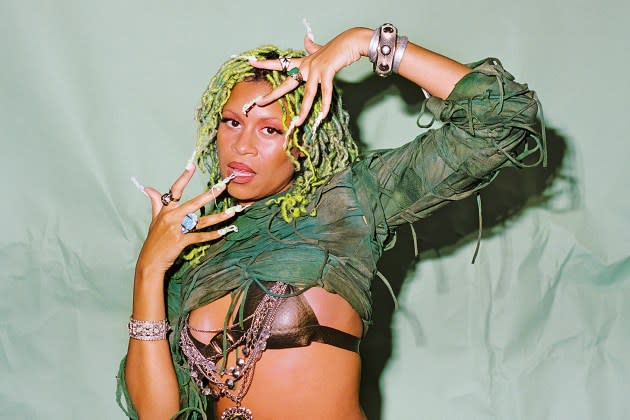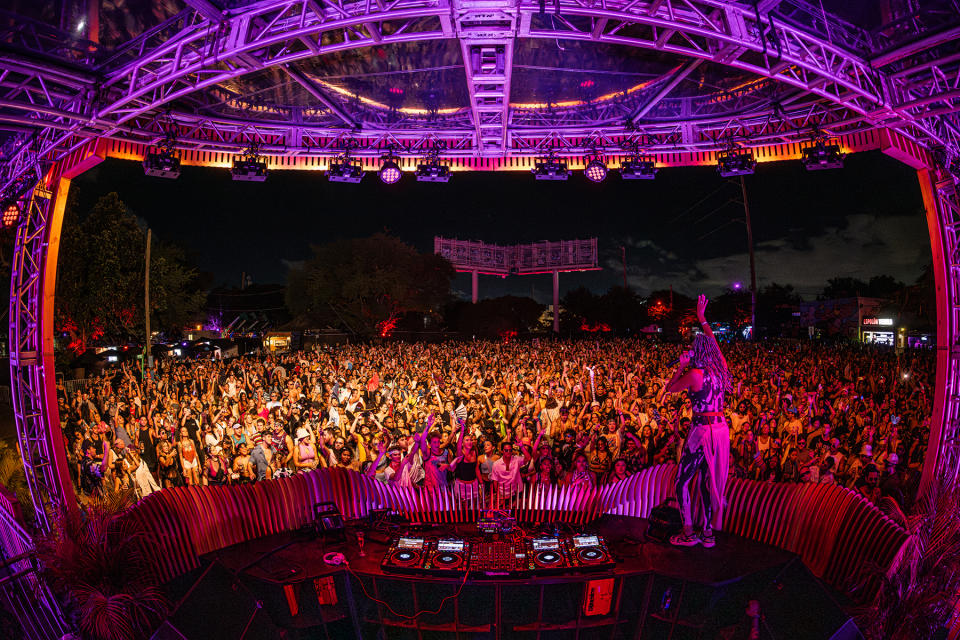How Electronic Musician Aluna Went From Being a Feature Artist to The Main Event

With more than 40 shows under her belt this year, electronic music artist Aluna Francis had one aim for Miami-based music festival III Points: to reconnect with her Black, queer fanbase. An hour before stepping on stage Saturday, she stopped to snap pictures, give hugs and later invited the EDM enthusiasts backstage as she cooed over a thunderous bass line.
“Connecting the Black ravers with a meet-up seems like a small thing, but today it’ll be everything to me,” Francis tells Rolling Stone from a III Points lounge. “Because the power of those connections to me is far more important than anything else that can happen.”
More from Rolling Stone
Electric Zoo Organizers Hit With Class Action Lawsuit After Disastrous 2023 Fest
Kygo and Calvin Harris Trade Hits at Palm Tree Music Festival in the Hamptons
Beyond Wonderland Attendees Detail 'Chaos' of Shooting: 'I'm Not OK'
Midway through her performance, she gave a special shout-out to the Black ravers in attendance and hopped onto the DJ booth to belt “Mine Oh Mine,” an anthem about shattering the glass ceiling and achieving personal autonomy.
The London-born electronic music veteran got her start as one-half of dance duo Aluna George and reached global acclaim through collaborations with Avicii, Flume, and Disclosure, and the release of dance hit “You Know You Like It” with DJ Snake. But Francis grew tired of being pigeonholed as a feature artist and craved further ownership of her identity and ethereal sound.
“I’m somebody who seeks to uncover places within myself where fear resides,” Francis says. “And I’m like, ‘ok girl what are you scared of now?’ Guess what? You’ve always been scared of going solo.”
In 2020, Francis released her first solo album, Renaissance, symbolic of how far the young Black girl from a predominantly white British suburb had come, and this summer, released Mycelium, a 14-track album that celebrates ’90s era dance with feature appearances from Pabllo Vittar, Route94, TSHA, Tchami & Kareen Lomax, Jayda G, Chris Lake, and MK.

Francis sat down with Rolling Stone before her Saturday show to talk about the meaning behind her sophomore album, celebrating Beyonce’s electronic dance album win at the Grammys and the value in performing at festival venues.
In September, Australian producer Alison Wonderland returned to the festival circuit after having a baby. What’s it like being a DJ with a four-year-old?
A full-time mom and a full-time touring artist really requires a mentality of believing that there is value in your child seeing a working mother who is doing something that fulfills her.
She’s seen me perform, but I choose very, very strategically which times I take her. When I took her to Red Rocks it’s because we were in Denver for both shows. I didn’t have to fly in between and the shows were in the daytime, so she’d be able to come to soundcheck and get an experience. That’s only happened like three times this year.
Can we talk about your motivation to jumpstart your solo career?
The landscape of me working as a Black woman in the dance music industry was that all people involved — in reconnecting artists and putting on shows – were all white. I was only really working with white producers, people [were] only presenting me white producers, and the requests were constantly like, can you do a feature on my track?
My new requirement is that if this is a white man, he has to be an ally. I’m not doing features with anyone. Only mutual collaborations where the business end is 50-50. I need to change the way that it looks for artists looking at me, because when you see Black women, always as featured artists on people’s music that really sends a message that that is your role in the industry.
You define your sophomore album, Mycelium, as a “cell network seeped into the fabric of nature.” Can you dissect that?
Black people in this industry do not have power, influence or money, necessarily. There aren’t labels run by Black people in dance music. But just connecting with people, even if they only had the same amount of influence as me or less, started to build up this other type of power.
If that’s what I’m doing, and that’s creating this music, what’s the name for that? What is the name for a cell network that shares nutrients, shares resource resources, yada, yada, yada? And that word was Mycelium.
In a Billboard interview in 2020, you talked about the lack of Black women within the Grammy’s best dance/electronic album category and then Beyonce took home the prize in 2022 for Renaissance. What was your response to Queen B’s win?
Let’s be honest, we needed serious dynamite. And the conversations around this were absolutely fascinating. One thing that nobody really understood was how much it would take for a Black woman to win in this category, and they were mad that somebody had the power to do that.
Electronic music festivals are still headlined by European or America-born white men. Although III Points showcased a robust lineup of artists of color, I’m wondering if you find conflict in performing at venues and festivals that fail to prioritize diverse voices?
When I go to these festivals, I’m not focused on this festival being the full picture. In the past, I would come to a festival and it would just be me floating around at the whim of the festival.
White men are continuously the only headliners, everywhere all the time. I’m so focused on the future that literally I’m like, how old school. How adorable. How boring, but that’s what people are like. They’re slow to change and if you’re on a mission like the one I’m on, you have to understand the timeline. If you allow the actual timeline to piss you off then you’re not going to be able to keep enjoying every step that you take.
Best of Rolling Stone

